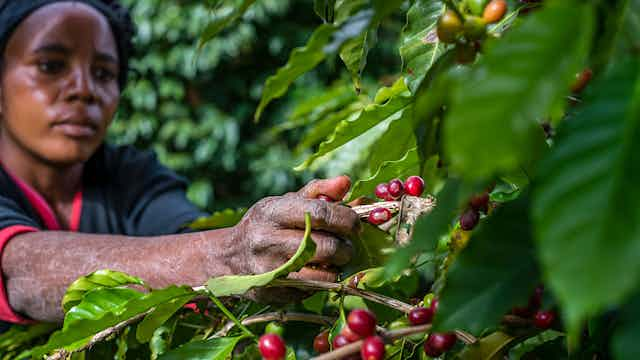Media coverage of Chinese land investments in African agriculture often reinforces narratives of a “weak African state” and the “Chinese land grab”, highlighting power imbalances between the actors involved in these land deals.
Are Chinese actors grabbing land in Africa and jeopardising local people’s land rights and food security?
China’s “Agriculture Going Out” policy, launched in 2007 as part of its broader “Going Out” strategy, was reinforced by the Belt and Road Initiative from 2013. Backed by these policies, Chinese foreign direct investment in Africa rose from US$74.81 million in 2003 to US$4.99 billion in 2021. By 2020, US$1.67 billion was invested in African agriculture, with nearly two-thirds targeting cash crop cultivation. Zambia ranked among the top ten African countries receiving Chinese foreign direct investment and loans.
My research on Zambian agriculture finds that Chinese land grabbing is a myth. Instead, Chinese investors have preferred different investment models according to the specific rules of land access, transfer and control of three land tenure systems in Zambia.
What ties the three types of Chinese agricultural investments together is this: land institutions matter. Whether it’s central government rules or traditional authority, these systems shape how foreign investment happens and what impact it has.
Each of the three models raises new opportunities and challenges for rural development and land governance. These findings matter because they offer insights into the future of land rights, livelihoods and state-building in African countries.
Not all land is the same
After independence, all land in Zambia was vested in the president, held in trust for the people. Today, the country still operates under a dual land system, as outlined in the 1995 Lands Act. State land, managed by the central government, includes both private and government leaseholds. Customary land, on the other hand, remains under the authority of traditional chiefs. The exact proportion of state and customary land in Zambia is contested, with estimates of customary land ranging widely from 94% to 54%.
This tenure distinction is significant because each type of land is governed by different rules regarding foreign access and ownership, which shape how foreign investors choose their investment models.
Over four months of fieldwork in Zambia, I gathered data on 50 Chinese agricultural projects (41 remained active) through 96 qualitative interviews. These projects were spread across three types of land tenure: private leasehold (37), government leasehold (1), and customary land (3).
Model 1: Commercial farm on private land
My fieldwork data showed that the majority of Chinese agricultural investments in Zambia are located on private leasehold land, typically following the commercial farm model. This type of land functions much like private property, held under 99-year leases that can be bought, sold or transferred. Investors use it for large-scale farming operations, such as maize, soybean and wheat production.
Even in these seemingly privatised spaces, however, state power remains influential. When Zambia proposed a draft National Land Policy in 2017 aimed at tightening rules for foreign land ownership, Chinese investors responded strategically. Many began aligning their projects with Zambia’s development priorities, emphasising contributions to local food security, donating to charities, and promoting themselves as responsible corporate actors.
Model 2: Farm block on government land
In northern Zambia, for example, a Chinese company partnered with the government to develop a farm block on state-owned land that had been converted from customary tenure for national development. Unlike the commercial farm model, the government played a central role, selecting the investor, managing the land and negotiating the deal. The project promised infrastructure and jobs, enhancing the political standing of local officials.
But this kind of state-led development works only when the promises are delivered. In other areas where farm blocks failed to materialise, traditional chiefs reclaimed the land. In the northern case, actual physical infrastructure investment helped reinforce state authority.
Model 3: Contract farming on customary land
The third model is very different. For instance, a Chinese agribusiness company arranged contract farming deals with over 50,000 smallholders in Zambia’s Eastern Province. Instead of buying or leasing land, the company provided seeds and bought cotton from farmers after harvest. This let the company access land informally, without triggering the legal and political risks of converting customary land to leasehold.
Operating on customary land posed challenges for investors. When farmers defaulted on loans or engaged in side-selling, companies had limited legal recourse and often had to negotiate with chiefs and local communities rather than the state. In such contexts, traditional authorities – not the central government – wielded the decisive power over land and its governance.
Why this matters
In a world where land deals are often controversial, understanding how local rules shape global investment is crucial. It’s not just about who buys the land, but under what terms, and how those terms are enforced. African governments are not just passive bystanders; they’re active players who use land institutions to negotiate power and development.
This research urges us to look beyond the headlines about “land grabs” and instead focus on the everyday politics of land. If African states want to steer rural development on their own terms, understanding and strengthening land institutions – both statutory and customary – is key.
This research is developed from Yuezhou Yang’s MRes/PhD project, which is supported by funding from the China Scholarship Council 201708040015.
By Yuezhou Yang, Research Fellow, London School of Economics and Political Science


